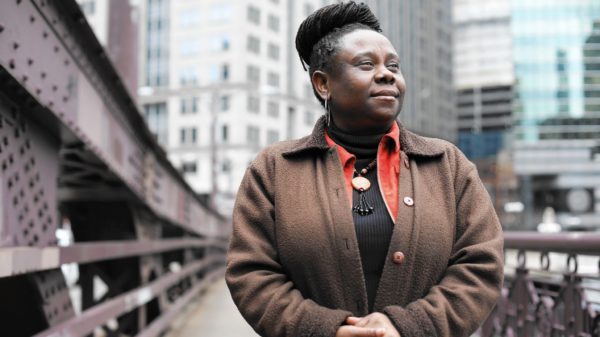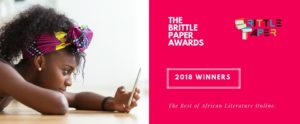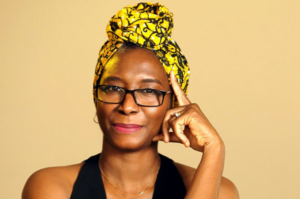
For LGBT History Month, we interviewed Unoma Azuah about her history as an activist for LGBTQ people in Nigeria, the role of literature in preserving LGBTQ history, her newest project — Between Man and God — which features narratives of queer West African women, and African writers who center the lives and experiences of LGBTQ people in their work. Unoma Azuah is a Nigerian writer, author, and activist whose research and activism focuses on LGBT writing in Nigerian literature. She has published three books, two of which have won international awards.
Brittle Paper
Could you talk a bit about your history as an activist fighting for the safety and rights of LGBTQ people in Nigeria, across the continent, and elsewhere?
Unoma Azuah
My LGBTQ activism started in the 80’s as a teenager cocooned in a convent high school, who wrote queer poems in her school magazine until she was whipped for being a lesbian. In college, I wrote queer poems and posted them on my departmental news boards until I was threatened with rape to correct my “evil ways.” As a fresh college graduate trying to find employment in Lagos, I was preyed upon by prospective employers who were mostly men, who often got irate that I rejected their sexual advances. I was numbed by heteronormative dominance. Erasure was a constant. I was invisible. My needs and preferences didn’t exist. I didn’t exist. To be alive and exist, your whole being has to be acknowledged: the complete human. There are no parts to identity. It has to be all, whole or nothing. Growing up, there were no queer models out there. I felt alone. Pushed against a wall, as I felt at the time, I had to “fight” back. I felt that somebody had to speak up. People had to start speaking up against the oppression of homosexuals. I had no means, but the only tool I knew I had and could use, I used: writing.
Fortunately, a close friend, Obi Nwakamma, gave me a national platform to speak up about a topic considered unmentionable, a taboo. This was in the 90s when Vanguard newspaper published my article, “Emerging Lesbian Voice in Nigerian Feminist Literature.” The backlash was terrifying. I got very scathing rejoinders. Then, I was so crippled with fear that I was convinced that I could be killed by homophobes at any moment. I would say that my activism started early, especially about the awareness of my sexual orientation and expressing it in writing. So, I progressed from writing about our existence to documenting African queer lives. Beyond writing as a tool for activism, I work with a number of LGBTQ non-governmental organizations (NGOs) in Nigeria to organize, sustain community, create awareness about our lives through films, music, radio talks, advocacy and strategizing on ways of survival, be it in creating safe spaces, counseling or interventions.
Brittle Paper
What role does literature play for you, in the preservation of LGBTQI history and in “defense of queer sex?”
Unoma Azuah
Literature saved me as a child when I felt that I didn’t quite belong to the world. Stories gave me a great means to escape, to work with my imagination, to breathe and be. Audre Lorde, Alice Walker, James Baldwin, Marcel Proust, James Isherwood, and Patricia Highsmith are some of the writers that provided those make-believe spaces for me. Even Enid Blyton’s character “George” was someone I could identify with as well as feel affirmed by. Some African writers like Ama Ata Aidoo and Wole Soyinka, though they created stereotypical gay characters who were either “alien” or “weird,” made me appreciate the role literature plays in initiating and starting conversations. When dialogues are started, there are definitely more chances of gaining better perspectives on differing and/or complex issues. The telling of stories matter because it changes lives and opinions. Literature is like a mirror that reflects our lives to show us areas to smoothen out, or strands to trim, etc.
Speaking of literature as a mirror, in Chinelo Okparanta’s Under the Udala Tree, I see a reflection of myself. For instance, in a manner similar to mine, Ijeoma’s mother strives to separate her from the places and people she genuinely loves. By bringing her daughter back from Nnewi, where she lived with family friends, to Ojoto, Adaora demonstrates a grave misconception of the idea of home. Home, for Ijeoma; home, for me, is where the heart finds love. Ijeoma’s marriage, her divorce and her eventual acceptance of her true self are definitive representations of my life. Moreover, our awareness of the purity of our form and our shameless embrace of that form is our protest against an unfortunate homophobic world. In telling our stories, documenting and sharing them, we take steps to continue showing our humanity. The more we are humanized, the more it becomes clearer to homophobes that we are their friends, bosses, teachers, doctors, classmates, co-workers, sisters, aunties, mothers, cousins, nieces and their daughters. Literature provides the platform for all possibilities.
Brittle Paper
I think that telling our stories to change hearts and minds is important. If for nothing else, building an archive of our stories helps the next generation to hold on to something most of my generation may not have had. Based on the successful curation of Blessed Body and Mounting the Moon, the idea of the new project, Between Man and God: Queer West African Women’s Stories, came up during a discussion I had with a friend. As an ally, he convinced me to push for a wider scope beyond Nigeria. Living in a heteronormative society like West Africa does not offer queer women the freedom to live their true lives. But we cannot, as human beings, succumb to the prejudice of otherness and the imposition of silence. So I intend, through this book project, to give the voices of these women the opportunity to be heard. The disinterest in the stories of women and queer women in particular is glaring and insensitive. The idea that queer people are unfit for economic and political opportunities is one myth that should be confronted, while demanding an egalitarian society that recognizes the strength and talents of queer women in West Africa. Since living is becoming more and more impossible for queer people in this part of the world, they only strive to survive. It is my hope that through writing and creating awareness on these issues, societies are touched enough to embrace diversity, respect queer people and accord full humanity to queer women. The contest aspect is included as a way to offer tokens of appreciation, to encourage more writing from queer women, and to give them voice and visibility no matter how small.
Brittle Paper
Who are some African writers whose work you admire and centers the narratives and experiences of African LGBTQI people?
Unoma Azuah
Those that come to mind include Chinelo Okparanta, Binyavanga Wainaina, Nakhane, Akwaeke Emezi, Abdellah Taia, Monica Arac de Nyeko, Jude Dibia, Nnanna Ikpo, Chike Frankie Edozien, Promise Ogochukwu, Siya Khumalo, etc. I am in awe of how they forcefully speak back to homophobia and skillfully illustrate the anxieties, the fears as well as the pains and pleasures of homosexuals and gender non-conformists in Africa. I admire their commitment and salute their courage. Again, Okparanta’s Under the Udala Tree, for instance, makes me marvel at the distinctive power of literature to vividly reflect life. My reality is that I am a lesbian born in Nigeria during the Biafra war. So my experience and that of Ijeoma, the protagonist of the novel, converge in a most evocative manner. Our fathers were victims of war. They died in our childhood. We grew up liking girls. Our attraction to girls was a source of worry for our mothers, who through the Christian agency attempted to free our body and soul from the sin of homosexuality.
Brittle Paper
Your memoir, Embracing My Shadow, is the first lesbian memoir from Nigeria. Could you talk about the significance and impact of queer community for you personally, especially in writing your memoir, and in the work that you do more broadly?
Unoma Azuah
Audre Lorde says that, “there is no liberation without community.” I am blessed to have a huge queer community across Africa. From Egypt to South Africa and their lives of resilience have been an inspiration for my memoir. I was quite enthused to have discovered when I did that our stories are mostly the same: they intersect and connect. It was as if we were living each other’s lives, so I was moved to tell my story, which is also their story. Writing it was therapeutic as well as fulfilling. I wrote for posterity, for little lesbians who will face the same hurdles I faced growing up. Perhaps, my memoir would assure them that they are fearfully and wonderfully made. That they are beautiful, and that they need no salvation from a homophobic world. So, I can say that my memoir can be seen as being representative of a large chunk of my queer community, and it is my hope that our mutual efforts to be seen and be heard will find an enduring expression today and beyond.









Ositadimma October 31, 2021 04:58
Home, for me, is where the heart finds love. I will never forget that. Thank you for this.